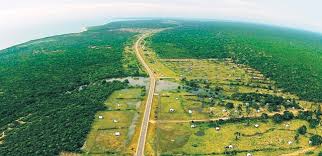Rajasthan madlyya Pradesh and Gujarat are all looking at potential sites were cheetah could be reintroduced. Given the precarious state of the cheetah population in Iran (thought to only be 50-60 animals) the reintroductions would come from Africa.
Continue reading “The possibility of reintroducing Cheetah to India is once again being looked at”10 years to save the worlds wilderness?
1/3 of the worlds species are threatened with extinction. There are many suggestions that this is just a natural process, but in recent decades it is not. This is not happening because of natural mechanisms, it is happening because of human behaviour. Indeed, while many of these species are being pushed to extinction through loss of habitat, there are many others that are disappearing because of overexploitation by humans.
Continue reading “10 years to save the worlds wilderness?”A forest is replanted after minister is found to have illegally cleared it
This story is extremely encouraging. Around the world, large plantation companies often encourage small holders to clear the land and then buy it from them.

The idea that this behaviour of getting other people to clear the land is permissible is insane. I personally would like countries to punish illegal clearance by always requiring full reforestation at the cost of the guilty party – this would likely end the scourge of illegal deforestation (then we must start working on so called legal deforestation)
Continue reading “A forest is replanted after minister is found to have illegally cleared it”Jair Bolsonaro is having a similar impact on environmental laws in Brazil to the impact of Donald Trump in the USA – will the effect be longer lasting?
Just like Trump in the USA Jair Bolsonaro has taken an axe to the environmental protections that Brazil has created over decades. Also just like Donald Trump, the majority of these moves have been done by Executive act. Between march and may last year, Jair signed 195 infralegal acts – and just like under Trunp these acts are thought to be only just legal and should have gone through their governmental body.

On pure numbers of fatalities (not to mention cost, simplicity and and health of our ecosystems), wolf reintroduction is a no-brainer
In the half a century running up to the year 2002, there are only 8 recorded fatalities from wolf attacks across the whole of Europe and western Russia. Also when thinking about this number we need to remember that the majority of these sorts of occurred in parts of the world where there are many wolves such as Western Russia.

Foolish attacks on renewable energy – Texas blackouts cannot be blamed on green energy
With incredibly cold weather hitting Texas (for instance the beach is covered in snow), Fox News has been making a big thing of the fact that some of the wind turbines are not turning supposedly because they froze – and that this is the cause of the blackouts.
This is factually incorrect. According to data from the Texas government wind turbine shutdowns accounted for less than 13% of the total outage. A bigger problem is freezing of oil and gas equipment throughout the state.
Continue reading “Foolish attacks on renewable energy – Texas blackouts cannot be blamed on green energy”Anti vaxxers are not limited to the developed world
The current president of Tanzania is starting that the country has eradicated Covid-19 and is dismissing the need for vaccines.. Why am I writing about this in a wildlife blog? The way that governments react to science is a good indication of the way that they will react to the natural world within their borders.
Continue reading “Anti vaxxers are not limited to the developed world”The Conservatives record on the environment
When David Cameron entered 10 Downing Street, he talked about it being the greenest government ever. While they have had to be in coalition for much of the period that the have been in power, it is clear that much of the negative effects on the environment has been pushed through by the conservatives not their partners.
Continue reading “The Conservatives record on the environment”
Cape leopards
Cape Leopards are a fascinating part of the leopard population of South Africa. It is estimated that there are as many as 1000 cape leopards living throughout the western cape. Now the western cape covers roughly 50,000 square miles so it is a rather large area, and they are spread across a few national parks. What is interesting about this group is that they are significantly smaller than any other group of leopards with females weighing around 20kg and males 35kg (generally leopards weigh between 60 and 70kg). Continue reading “Cape leopards”
Transfrontier parks – allowing wildlife to exist closer to how it did before humans arrived
In Africa it is becoming increasingly common for national parks to be declared on both sides of a border. This allows the protected area to be vastly larger than either country could succeed in, on its own. This is important because many of the mammals that live in Africa need a lot of space and live at low densities. Without transfrontier parks it would be too expensive to protect a large enough area to support populations of animals such as wild dog and cheetah. In an ideal world this is a relatively simple solution, however as with everything it isn’t often that simple. With war and famine and other problems the animals could suddenly become less secure in one country than another. Continue reading “Transfrontier parks – allowing wildlife to exist closer to how it did before humans arrived”











